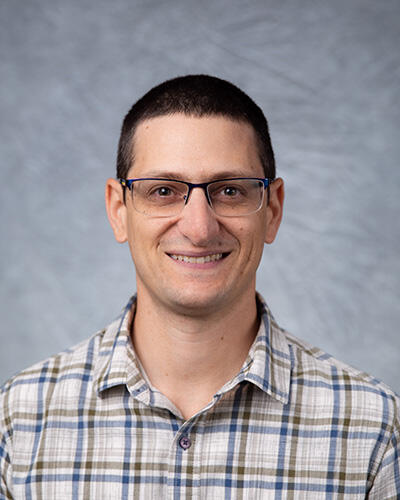Bradley Taber-Thomas has been a member of Geneseo faculty since 2018.
Office Hours
Fall 2023: Tuesday/Thursday 12:30-1:30pm and by appointment
Research Interests
-
Dr. Taber-Thomas' research is at the intersection of cognitive, affective, and developmental neuroscience. Our lab studies the role that emotion and attention-related brain systems play in social-emotional functioning, development, and risk for psychopathology. We are particularly interested in what happens to attention and social-emotional processes when the frontolimbic brain system is modified by typical or atypical development, by brain injury (stroke or concussion), or by intervention (attention bias modification, Parent-Child Interaction Therapy, pharmacological). Current research studies include: studying patterns of attention and brain function in children at risk for anxiety, developing novel methods for capturing behavioral and brain markers of psychological risk, and examining daily fluctuations in attention biases.

Curriculum Vitae
Education
Ph.D., Cognitive Neuroscience, University of Iowa, 2011
M.A., Philosophy, Georgia State University, 2008
B.A., Modern Languages, Northeastern University, 2004
Recent Courses Taught
Introductory Psychology
Developmental Social-Cognitive Neuroscience
Introduction to Behavioral Research Methods
Child Development
Adolescent Development
Psychophysiology
Selected Publications
Liu, P., Taber-Thomas, B.C., Fu, X., & Pérez-Edgar, K.E. (2018). Biobehavioral markers of attention bias modification in temperamental risk for anxiety: a randomized control trial. Journal of the American Academy of Child & Adolescent Psychiatry 57(2), 103-110.
Morales, S., Taber-Thomas, B.C., & Pérez-Edgar, K.E. (2017). Patterns of attention to threat across tasks in behaviorally inhibited children at risk for anxiety. Developmental Science 20, e12391.
Taber-Thomas, B.C., Morales, S., Hillary, F., & Pérez-Edgar, K.E. (2016). Altered topography of intrinsic functional connectivity in childhood risk for social anxiety. Depression and Anxiety 33(11), 995-1004.
Taber-Thomas, B.C.,* Asp, E.W.,* Koenigs, M., Sutterer, M., Anderson, S.W., & Tranel, D. (2014). Arrested Development: Abnormally Egocentric Moral Judgment After Developmental-Onset Prefrontal Cortex Damage. Brain 137(4), 1254-1261. (*equal contribution)
Classes
-
NEUR 205: Neuroscience Technology Lab
Students will review and respond to selected readings, videos, animations, and virtual experiments designed to demonstrate the application of theory and techniques used in Neuroscience.
-
NEUR 206: Neuroscience Practical Lab
Students will participate in weekly laboratory exercises designed to demonstrate the application of theory and techniques used in Neuroscience.
-
PSYC 321: Dev Psych:DevSocl/CogNeurosci
An advanced course examining particular developmental domains or issues, with an emphasis on evaluation of contemporary research. Typical offerings include topics in cognitive development, social development, and applied developmental psychology.